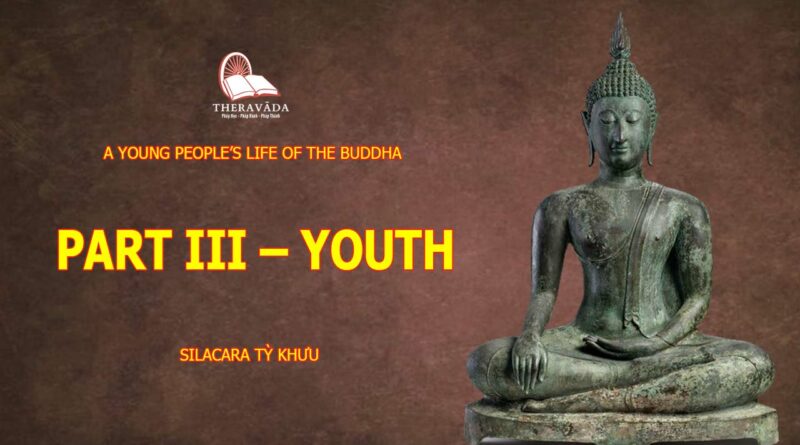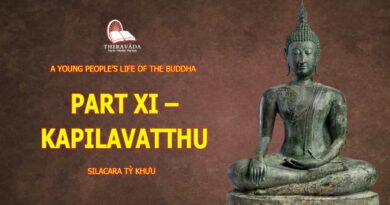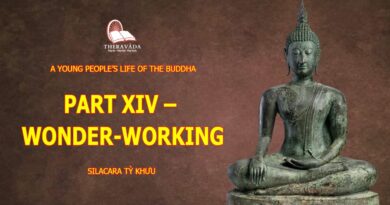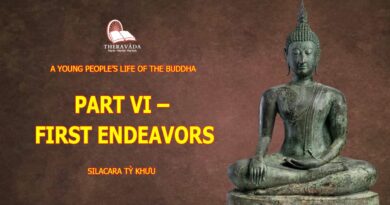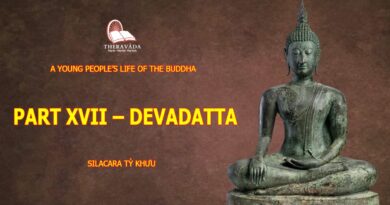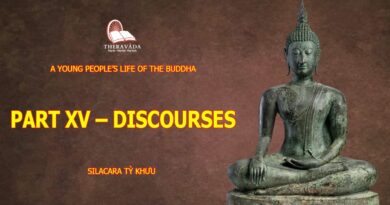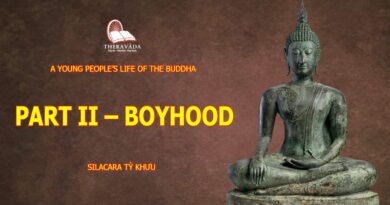A YOUNG PEOPLE’S LIFE OF THE BUDDHA: PART III – YOUTH
In those days in India everybody knew that everything man needs for his life comes out of the ground, and that, therefore, the man who cultivates the ground and makes it bring forth food without which men cannot live at all, is the man who does the most useful and necessary work in any nation. So, once a year it was the custom in those days for the king of the country himself, along with his ministers, to go out to the fields and with his own royal hands, plow a field, and so set an example to all his people not to be ashamed of honest, honorable labor.
And one day in the spring, at the beginning of the plowing season, King Suddhodana went out from Kapilavatthu in full regal state, to carry through this yearly observance of the “Royal Plowing,” as it was called. And all the people of the city went out after him, for this was their great annual holiday festival, in order to see their King plowing and to share in the feasting and merry-making that always followed. And the King took his young son with him out to the fields, and leaving him in the care of some attendants, he went to the plowing place and taking hold of the shafts of his own plow which was all decorated with gold, he plowed up and down the fallow field, followed by his ministers with their plows and oxen ornamented with silver, the ordinary farmers coming last with their common plows and yokes of oxen, all of them turning over the rich, fat, brown soil so that it might be made ready for the seed.
After a time, when the feasting began, Prince Suddhodana’s attendants went off to share in it; and by and by all of them had gone away, quite forgetting the young prince, and leaving him alone by himself. Then, seeing himself thus left alone, the prince felt rather pleased, for already he was a thoughtful boy, and he wanted to get a chance to think quietly about what he had seen on this day of feasting and rejoicing, so he wandered away quietly by himself till he came to a nice, shady apple tree, and there he sat down and began to turn everything over in his mind.
First, so his thoughts ran, there was his father the king and all his ministers and the cultivators after them, plowing the land, and all were very happy and pleased looking; but he had noticed that the oxen did not look as if they were very happy. They had to pull their very hardest to make the plow go through the tough, turfy soil; they had to tug and strain at it till they were all perspiring and panting for breath. Evidently life was not easy for them, not even on a holiday like this when everybody else was making merry. They had to work hard; and often when they did not do exactly as their masters wished, they had to take harsh words and harsher blows. And young Prince Siddhattha thought that even amid the pleasures of a great holiday, there is always something that is not so pleasant.
And then from under his apple tree he looked at the movements of the birds and beasts and insects around him, and he noticed a lizard ran out near his feet and with its quick, darting tongue begin to lick up and eat the little, harmless, busy ants. And then, in a little while, a sly snake came along and caught the lizard in its jaws and swallowed it. And then a hawk swooped down from the sky and picked up and killed and devoured the snake. And again the prince began to think deeply and ask himself if it really was so, that all the prettiness and beauty of the shows of life have all got some thing at the back of them that is not pretty and beautiful at all. In all his own young life yet, he himself had not suffered anything, but as he looked round him now and pondered on what he saw, he perceived that there was a good deal of suffering going on all the time for somebody or something, even though he himself happened to be free from it. And he sat there intently until he became so wrapt up in his thoughts that he forgot everything else, forgot all about the day’s festival, and his father, and the plowing, and everything.
In the meantime the “Royal Plowing” was done, and the feasting that followed it was all over. But when the young prince’s attendants came back to where they had left him, they could not find him; he was not there. Very much frightened, they started looking for him everywhere, for soon his father the king would be asking for him in order to take him home with him. At last, they found him sitting as quiet and still as a stone statue under his apple tree, so completely absorbed in his thoughts that at first he did not know they were speaking to him. But when at length they succeeded in making him understand that his father was calling for him, that the hour was getting late and it was time to go home, then he rose and went back with them to his father; but all the way home his heart and thoughts were filled with pity and concern for all living things that love their lives so much, and yet find it so hard to live.
But the king was far from pleased to find that his son was beginning so early to think seriously about life and what it really means. He began very much to fear that what the old hermit had said was already beginning to come true, that his son’s thoughts already were turning in the direction of the religious life, and that if they were not soon turned away from it, what he was so much afraid of would come to pass, and Siddhattha would leave his father’s house, and he would have no son left to follow him on the throne of the country. So he resolved at once to do something to turn his son’s mind away from such serious thoughts. He resolved to make life in every possible way so pleasant and comfortable for his son that in his own pleasure and enjoyment, he would stop thinking so much about how other beings fared in life.
So he ordered his workmen to build three splendid palaces for his son. The first one was built of good, stout blocks of wood outside, and lined inside with fine, sweet-smelling cedar. In this warm, comfortable palace, he meant his son to live during the cold winter season. The second palace was built of cool, polished marble, so as to be nice and pleasant to live in during the hot season when everything outside was burning in the hot sun. And the third palace was built of good hard bricks and had a roof of blue tiles on it to keep out the heavy monsoon rains. In this last palace the king meant his son to pass the rainy season safe from its damp and chills. Round each of these palaces, also, he caused to be laid out a splendid pleasure-garden planted with every kind of shady and flowering tree, with many ponds and running streams in it where there grew lotuses of all colors, so that the prince might be able to go out walking or riding in it when he chose, and always find coolness and shade and flowering beauty wherever he looked.
But all these pleasant things, palaces, gardens, ponds, walks and rides, and the hosts of pleasant companions that were provided along with them, were all of no use to stop the young prince from thinking. And the king saw this. He saw that all he had contrived to turn his son’s thoughts towards his own pleasure only, had completely failed, and he called his ministers to him and asked them what else he could do to make sure that the old hermit’s prophecy should not come true.
His ministers replied that, in their opinion, the best way to occupy a young man’s mind so that he would not think about such things as leaving the worldly life, would be to get him married to a nice, pretty young wife. Then, so they said, he would be so taken up with her that he would have no time or inclination to think of anything else; and in due time, when his father wished it, he would take his place on the throne in the regular way, and live in the world just like everybody else.
This seemed to the king to be very good advice; but how could he make sure of getting for his son a wife so lovely and attractive that once he was married he would be completely to her, altogether charmed with her loveliness, and henceforth live with no other object but to make her perfectly happy?
After considering the matter for some time, the king hit upon a good plan. He sent out an order that all the most beautiful maidens in the country were to come to Kapilavathu on a certain day and pass before Prince Siddhattha in order that he might say which of them was the most beautiful and give her a prize for her beauty; while each of the others who came and showed themselves would receive, each one, a gift from the hand of the Prince, great or small, according as he thought her to come near or fall below the chief of them all in beauty.
Now when King Suddhodana gave this order, he also arranged that some of his ministers should keep a close watch on his son as the procession of beautiful maidens passed before him, and if they saw him show any sign of special pleasure when any particular maiden came forward to receive her gift, then they were to take note who she was and come and let him know.
So the day came for the beauty competition, and all the fairest, most beautiful girls in the kingdom passed in a brilliant, dazzling procession of loveliness before the prince, one after another, and each received from his hands the gift which he thought her beauty deserved. But instead of being pleased thus to come close and touch the hand of their sovereign’s son, each girl seemed to be almost afraid as she approached him, and glad, when, having got her gift, she was at liberty to pass on and run back among her companions again.
And there was a good reason for their behaving in this unusual way. For this prince of theirs was not at all like any other young man they knew. He did not seem to be looking at them, or indeed, thinking of them at all! He handed each girl her gift, but he seemed to be thinking of something else altogether, something great and solemn it seemed, far far beyond their smiling faces and dainty ways. Indeed, some of them said that as he sat there on his prince’s throne, he seemed to them to be more like a god than a human being. And the ministers who, by the king’s command, were watching him, felt almost afraid at the thought that they would have to go back and tell King Suddhodana that his and their plan had failed, that his son had not shown the least pleasure at the sight of a single one of all the beauties who had passed before him. For now nearly all the girls had passed, nearly all the prizes had been given away, and the prince still sat there unmoved, his mind evidently far away from this scene of delight for everybody else, this gay procession of one beauty after another.
But now, just as the last girl took the last prize from the prince’s hand, and curtsied and passed on, there came along hastily, a little late, one more girl; and those who were watching the prince noticed that he gave a little start as she drew near. The girl too on her part, instead of passing him with her eyes timidly turned on the ground as all the other girls before her had done, looked Prince Siddhattha straight in the face, and with a smile asked “Is there no gift left for me, too?”
“Sorry am I,” said the prince smiling back to her, “that all the gifts I had to give out are finished but take this.” And with that he took a string of splendid jewels from his neck and clasped them round the girl’s waist.
Then the king’s ministers, when they saw this, were very glad; and after they had found out that the name of this young girl who had come last, was Yasodhara, and had learned where her father Suppabuddha lived, they went back to king and told him all about it; and they very next day the king sent off messengers to Suppabuddha, asking that his daughter Yasodhara might be given in marriage to Prince Siddhattha.
Now it was the custom among the Sakya people who were a strong, vigorous, mountain folk, that when any young man wanted to marry, he first must show himself as clever and skillful in horse-riding, shooting with the bow and arrow, and wielding the sword, as any other young man in the kingdom; and Prince Siddhattha, although he was the heir to the throne, had to follow this custom just the same as every other young man.
So one day there came to the //maidan// of Kapilavatthu, all the strongest and cleverest young men of the Sakya kingdom, all the best horsemen and archers and swordsmen. And each of them before the assembled crowd of ministers and people, showed what he could do with horse, with bow and arrow and with sword. And Prince Siddhattha, mounted on his white horse Kanthaka, showed what he could do, also; and in the contest with the others he showed that he was as good as, and even better than, the best in the country.
At shooting with the bow and arrow, he sent an arrow farther than the young man who up till then had been considered the best archer in the kingdom, his own cousin Devadatta.
At the exercise or test with the sword, he cut a young, growing tree through so neatly and cleanly at one stroke, that after his sword had passed through it, it still remained standing for several moments, so that those who were judging the contest at first thought it had not been cut through at all. But then there came a puff of wind, and the tree fell over to the ground, and everybody saw that it had been cut through as smooth and even as a piece of butter. At this test, Prince Siddhattha beat his own half-brother Nanda, who, so everybody thought, could not be beaten at swordsmanship by anyone in the country.
The next test was in horse-racing; and on his fast white horse Kanthaka, Prince Siddhattha easily left all the others behind. But they were not satisfied to see him win this test so easily. They said: “O, if we had a swift horse like that to ride, we could win a race to. This is only the merit of the horse; it is not the merit of the man. But we have here a wild, black stallion which has never yet allowed any man to get on his back. Let us now see which of us can mount him and stay on his back longest.”
So all the youths tried hard, one after another, to catch hold of the stallion and swing himself on to its back, but all of them were flung to the ground by the proud, fierce animal, until it came to the turn of Arjuna, the best rider in the kingdom. After a little struggle, this Arjuna managed to get on the stallion’s back and stay there while he whipped it once round the race-course. Then, before anybody knew what it was going to do, the savage animal bent its head round quickly, and catching Arjuna by the foot with its big strong teeth, it pulled him by main force out of the saddle and dashed him to the ground, and if some of the syces had not run forward quickly and dragged him away, while others beat off the stallion, it would have trampled Arjuna to death. Then it Siddhattha’s turn to try to ride the stallion, and everybody thought he would be sure to be killed, since Arjuna the best rider in the country had just missed being killed by it. But Prince Siddhattha just walked quietly up to the stallion, laid one hand on its neck and the other on its nose as he spoke a few soft, gentle words to it; then he patted it on its sides, and to the surprise of everybody, it stood still and allowed the prince to mount it and ride backward and forward just as he wished, subdued entirely to his will. It was the first time anybody had come near it who was not afraid of it and did not want to beat it, but instead spoke and acted kindly to it; and in its surprise at this new kind of treatment, the stallion allowed the prince who was neither afraid of, nor angry at, it, to do as he pleased with it.
Then every one admitted that Prince Siddhattha was the best horseman in the kingdom, too, and well worthy to be the husband of so fair a maiden as beautiful Yasodhara. And Suppabuddha, Yasodhara’s father, also agreed that this was so, and he willingly gave his daughter as wife to so handsome and manly a young prince. And so Prince Siddhattha was married amid scenes of great rejoicing to beautiful Yasodhara, and went with her to live in a new and splendid palace which the king had caused to be built for them, surrounded by everything delightful and pleasing that any young man’s heart could desire.
And now King Suddhodana was beginning to feel satisfied that his son would no longer think about giving up his chance of getting a throne and becoming a religious man. But in order to make quite sure that his thoughts would never turn in this direction, the king ordered that nobody about the prince, none of his servants or attendants within the palace walls or grounds, were ever to speak a single word about such things as old age, or sickness, or death. They were always to act as if there were no such unpleasant things in the world.
More than that. The king sent away from his son’s palace all the servants and attendants who showed the least sign of getting old or weak or sickly. He arranged that there should be nobody in the palace and the gardens round it but young, happy, pleasant, smiling people. Those who happened to fall ill were at once taken away and not allowed to come back until they were perfectly well again. The king also gave strict orders that no one when at the princes’ presence, was to show any sign of weariness or sadness. Everybody round him was required to be cheerful and merry and bright all day long. And at night too, when his attendants danced and sang before the prince, they were never to show any signs of weariness or fatigue with their exertions. In short: King Suddhodana tried so to arrange everything and everybody around the prince that he should not know or even suspect that there was anything else in the world but smiles and laughter and joyous, happy youth. For, to complete his arrangements, he caused a high wall to be build round the prince’s palace and gardens, and gave strict command to the keepers of the gates that on no account were they to allow the prince to pass outside.
In these ways did King Suddhodana think to make sure that his son would never come to see anything but the pleasing sight of youth and beauty, never hear anything but the pleasant sounds of songs and laughter, and so be content to live as his father had done before him, and never wish to become a religious ascetic, or seek any other higher good than the life of a King’s favorite son.
Source: Budsas.net

